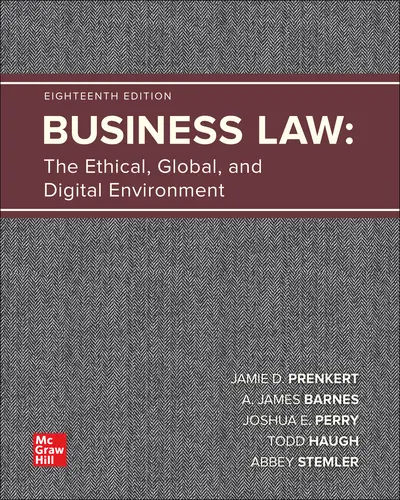My Account Details

ISBN10: 126073689X | ISBN13: 9781260736892

* The estimated amount of time this product will be on the market is based on a number of factors, including faculty input to instructional design and the prior revision cycle and updates to academic research-which typically results in a revision cycle ranging from every two to four years for this product. Pricing subject to change at any time.
Instructor Information
Quick Actions (Only for Validated Instructor Accounts):
Throughout its 80 years of existence, Business Law: The Ethical, Global, and Digital Environment has been a leader and an innovator in the fields of business law and the legal environment of business. This textbook was the first to inject regulatory materials into a business law textbook, defining the legal environment approach to business law and over the years, has also been a pioneer, introducing materials on business ethics, corporate social responsibility, global legal issues, and e-commerce law. One reason for the book’s success is its clear and comprehensive treatment of the standard topics that form the traditional business law curriculum, providing all business majors with a firm understanding of law in the context of business. It engages students with cases that are current and relevant, but also maintains “landmark” cases, as well as cases from the past, that are superior to more current cases in teaching students a particular topic. The program also provides content topics that address accreditation standards set by the AACSB with a focus on ethical issues and global issues with Ethics in Action boxed features and chapters covering international topics like corporate inversions. The 18th edition will continue to be an innovator in business law preparing your students for the real world.
Part 1 Foundations of American Law
1 The Nature of Law
2 The Resolution of Private Disputes
3 Business and the Constitution
4 Business Ethics, Corporate Social Responsibility, Corporate Governance, and Critical Thinking
Part 2 Crimes and Torts
5 Criminal Law and Procedure
6 Intentional Torts
7 Negligence and Strict Liability
8 Intellectual Property and Unfair Competition
Part 3 Contracts
9 Introduction to Contracts
10 The Agreement: Offer
11 The Agreement: Acceptance
12 Consideration
13 Reality of Consent
14 Capacity to Contract
15 Illegality
16 Writing
17 Rights of Third Parties
18 Performance and Remedies
Part 4 Sales
19 Formation and Terms of Sales Contracts
20 Product Liability
21 Performance of Sales Contracts
22 Remedies for Breach of Sales Contracts
Part 5 Property
23 Personal Property and Bailments
24 Real Property
25 Landlord and Tenant
26 Estates and Trusts
27 Insurance Law
Part 6 Credit
28 Introduction to Credit and Secured Transactions
29 Security Interests in Personal Property
30 Bankruptcy
Part 7 Commercial Paper
31 Negotiable Instruments
32 Negotiation and Holder in Due Course
33 Liability of Parties
34 Checks and Electronic Transfers
Part 8 Agency Law
35 The Agency Relationship
36 Third-Party Relations of the Principal and the Agent
Part 9 Partnerships
37 Introduction to Forms of Business and Formation of Partnerships
38 Operation of Partnerships and Related Forms
39 Partners’ Dissociation and Partnerships’ Dissolution and Winding Up
40 Limited Liability Companies and Limited Partnerships
Part 10 Corporations
41 History and Nature of Corporations
42 Organization and Financial Structure of Corporations
43 Management of Corporations
44 Shareholders’ Rights and Liabilities
45 Securities Regulation
46 Legal and Professional Responsibilities of Auditors, Consultants, and Securities Professionals
Part 11 Regulation of Business
47 Administrative Law
48 The Federal Trade Commission Act and Consumer Protection Laws
49 Antitrust: The Sherman Act
50 The Clayton Act, the Robinson–Patman Act, and Antitrust Exemptions and Immunities
51 Employment Law
52 Environmental Regulation
Accessibility
Creating accessible products is a priority for McGraw Hill. We make accessibility and adhering to WCAG AA guidelines a part of our day-to-day development efforts and product roadmaps.
For more information, visit our accessibility page, or contact us at accessibility@mheducation.com
Affordability
Reduce course material costs for your students while still providing full access to everything they need to be successful. It isn't too good to be true - it's Inclusive Access.
Need support? We're here to help - Get real-world support and resources every step of the way.